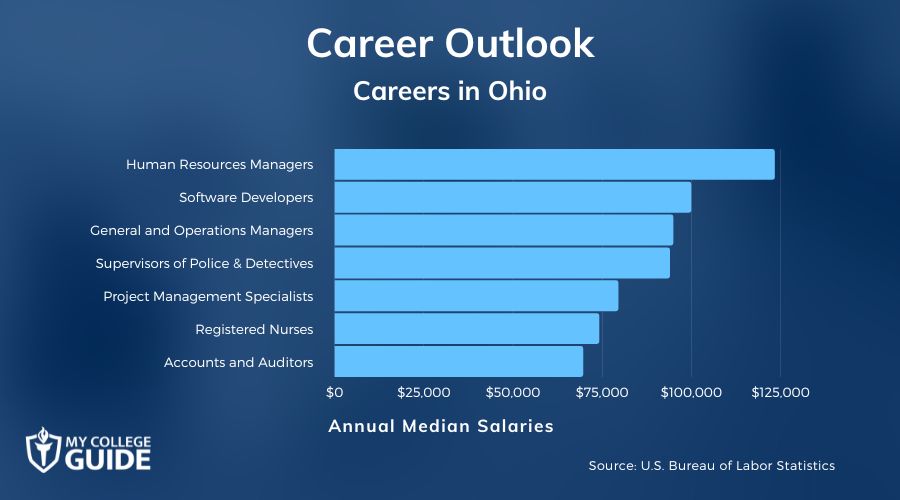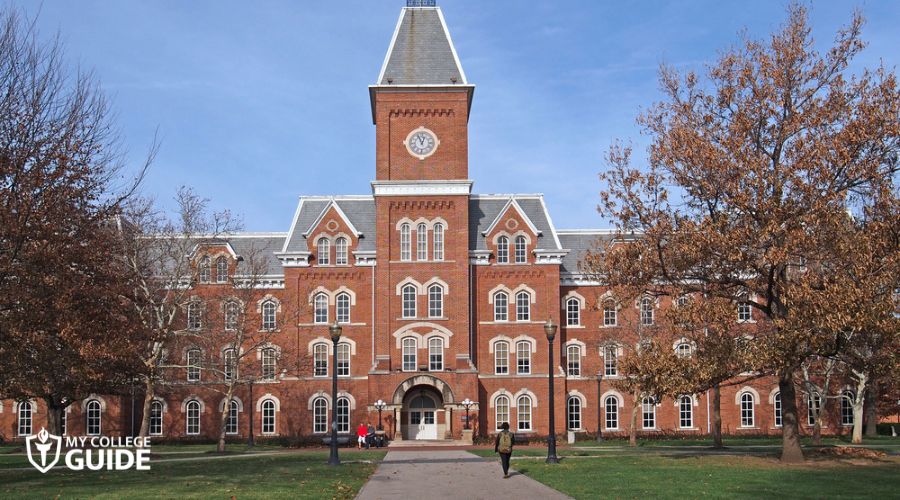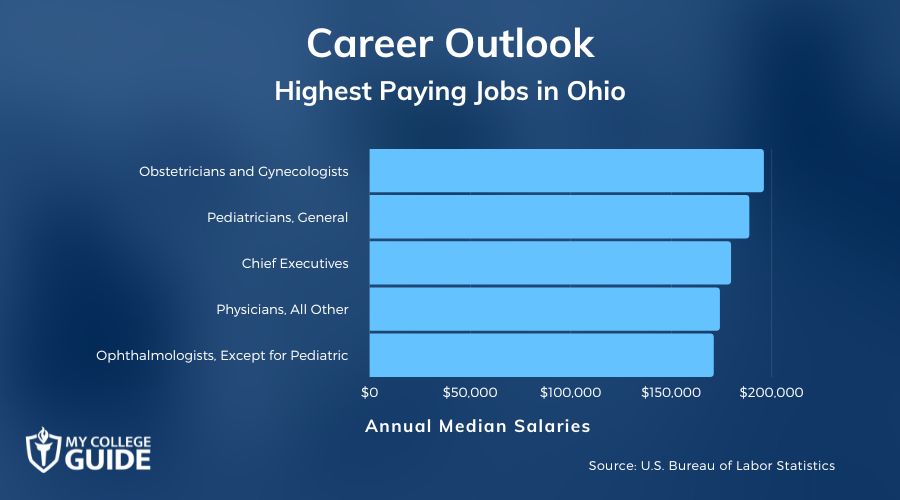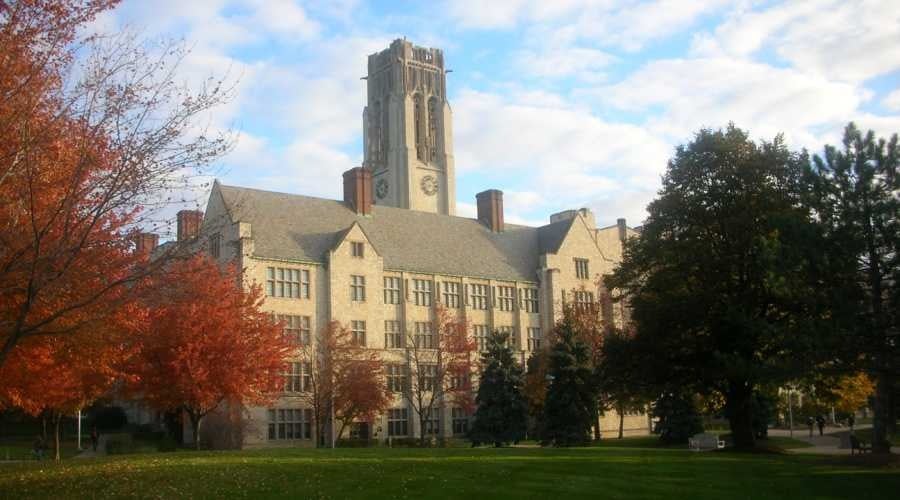The increase in online colleges in Ohio demonstrates the state’s commitment to higher education. The Buckeye State has developed an array of policies, practices, and programs to help improve college attainment.

The state’s goal is for 65% of Ohioans ages 25-64 to have a degree, certificate, or another postsecondary workforce credential of value by 2025. Progress reports show impressive growth, but the state understands the need to prioritize adult learners, under-represented minorities, and women in order to meet its goal.
Editorial Listing ShortCode:
The Ohio Department of Higher Education, and indeed the state as a whole, is deeply committed to providing superb postsecondary institutions that result in a qualified and successful workforce for Ohio’s future.
Online Colleges in Ohio

According to data from the National Center for Education Statistics (NCES), Ohio higher education students are taking advantage of accredited online colleges. Almost 30% of these students are enrolled in fully online degree programs, and another 33% are enrolled in one or more online courses.
The numbers continue to rise as colleges amp up their online course offerings. At certain universities throughout Ohio, there are dozens of undergraduate and graduate degree and certificate programs offered online.
There are online options in nursing, computer information technology, criminal justice, engineering, education, and business.
Editorial Listing ShortCode:
Other universities offer more than 40 online degrees and programs. At the undergraduate level, there are just a handful of online programs, but at the graduate level students can choose from a wide variety of fields, including medicine, engineering, social work, business, and more.
In addition to all of the state’s excellent schools, Ohio has another excellent resource for online learning: OhioLearns. The site provides a searchable catalog of all online courses, degrees, and certificates available within the state.
Common Online Degrees in OH

While degrees offered vary by school, these are some common degrees you are likely to find at Ohio colleges and universities online and what these programs often entail:
- Accounting: With an accounting degree, you can pursue a career as an accountant or other careers in finance.
- Criminal Justice: This degree can help you pursue a law enforcement career, including a career as a police officer and an investigator.
- Registered Nurse: A registered nurse degree is typically required to become a licensed nurse in most states and covers the knowledge and skills needed to become a nurse.
- Human Resource Management: This degree helps develop the skills to hire, train, coach, and manage employees and develop workplace culture.
- Healthcare Administration: A healthcare administration degree may be ideal if you are interested in a career in healthcare management and supervision.
These are some of the common Ohio online degrees that coincide with some of Ohio’s more in-demand careers and employment opportunities. There are many other degrees that you may pursue.
Overview of Higher Education in Ohio

In Ohio, there are 155 degree-granting institutions, according to the NCES. Of those, 60 are public schools, 69 are non-profit private schools, and 26 are for-profit private schools.
The NCES further indicates that in-state student pay, on average, $10,049, a year in tuition and fees to attend one of Ohio’s 4 year public schools, which is a bit above the national average. Out-of-state students pay on average pay around $26,213 a year for the same schools, which is a bit below the national average.
Students in the Midwest may be able to save on tuition, thanks to Ohio’s partnership in the Midwest Student Exchange Program (MSEP). MSEP allows qualifying students to enroll at public universities within the 9 participating states for no more than 150% of the in-state tuition rate. This opens the door to a much wider selection of programs.
Employment Outlook for College Graduates in Ohio

Ohio’s job market continues to grow, especially in certain industries, like healthcare, which can be beneficial for graduates pursuing employment.
In addition to strong job growth in certain fields, the unemployment rate in Ohio continues to decline. Based on Bureau of Labor Statistics data, two of the most employed occupation sectors are office and administrative support and transportation and material moving.
Many jobs can also be found in healthcare, with some positions, like medical and health services managers expected to grow 28% over the next decade. Many growing careers, especially those in healthcare, tend to pay above-average salaries, based on information from the Bureau of Labor Statistics.
Careers & Salaries in Ohio

Career opportunities in Ohio are widely varied and many careers are in demand and continue to grow, which can be good news for some graduates looking for work.
Graduates interested in accounting, finance, and business can find numerous opportunities to pursue within the field of business and financial operations. Healthcare, transportation, management, sales, and education are some of the most in-demand industries in Ohio.
Editorial Listing ShortCode:
Based on data from the Bureau of Labor Statistics, listed below are ten careers that graduates may pursue after earning their online bachelor’s degree in Ohio.
| Careers | Annual Median Salaries |
| Human Resources Managers | $120,060 |
| Software Developers | $104,500 |
| First-Line Supervisors of Police and Detectives | $95,470 |
| General and Operations Managers | $87,960 |
| Project Management Specialists | $83,410 |
| Registered Nurses | $76,810 |
| Accountants and Auditors | $72,740 |
| Human Resources Specialists | $62,590 |
| Bookkeeping, Accounting, and Auditing Clerks | $44,160 |
| Nursing Assistants | $34,990 |
These are just some of the careers available in the state. In addition to the careers listed above, there are numerous careers in protective service occupations, including criminal investigators and fish and game wardens.
Specific career availability and salaries depend on a number of factors, including location, education, and work experience.
How to Know If an Online Degree Is Right for Me

As you look into earning an online bachelor’s degree in Ohio, several factors may be considered to decide if it’s right for you.
- Schedule: An online degree may be for you if you need the scheduling flexibility that some online courses offer, allowing you to work around existing commitments.
- Distance: If the degree you want to pursue is offered at a school either out of state or a good distance away, an online degree can help remove commuting issues.
- Self-motivation: Online learning can require good motivation and self-discipline, especially when working on your own schedule or pace.
- Organization and Time Management: Earning an online degree also requires staying organized and managing your time effectively as you juggle school and life.
While online learning may not be for everyone, it can potentially be ideal for those managing their coursework with other responsibilities.
Pros and Cons of Online Degrees
As you look into options for Ohio online degrees, considering the pros and cons of online degrees can help you make the best decision for you.
You may want to rank which pros and cons are most important to you to help decide if an online program fits you.
| Pros | Cons |
|
|
Knowing how you learn best and the environment you work better in is an important consideration and unique to each student.
How to Choose an Online Ohio College Program

As you look into the best colleges in Ohio online, there are numerous factors to take into consideration. Some of the key considerations are listed below.
- Accreditation: A school’s accreditation status verifies its education standards and can potentially affect your future education and career opportunities.
- Resources: Some schools may offer more support than others, from online tutoring services to access to online resources available to online students.
- Program offerings: If you are interested in a specific degree or career, you’ll need to consider the degrees offered and if they align with your career goals and interests.
- Tuition and fees: Tuition and any potential fees are key factors to consider, as well as scholarships or other financial aid a school may offer.
- Faculty: Another factor to consider is the school and program’s faculty, qualifications, and experience in teaching online courses.
- Course format: One factor to consider is how online courses are scheduled, such as whether you need to be logged in to class at a specific time or can work independently.
- Student-to-teacher ratio: The student-to-faculty ratio, which may vary by program, may be important if you prefer or need a smaller ratio.
- Coursework and requirements: It is important to review the program requirements and make sure they work for you, including any on-campus components that may be required.
It may be helpful to prioritize which factors are most important to you as you look into Ohio colleges and universities online, finding the schools that most closely align with your needs.
Should I Study in Ohio?

If you’re considering studying in Ohio, there are several factors you may want to take into account that can make it an attractive place to study for many.
- Cost of living: The cost of living in Ohio is below the national average, making it an attractive choice for many students.
- Top-rated colleges: Ohio is home to some top-rated colleges offering online and on-campus programs.
- Job opportunities: Due to a growing economy and several large companies with headquarters in Ohio, the job outlook for graduates is positive.
- Culture and recreation: Ohio has its share of cultural offerings, including art and music, and a wide variety of natural attractions that students can get outside and explore.
- Earning potential: Many of Ohio’s highest-paying jobs require a bachelor’s degree, potentially allowing students to find lucrative employment after graduation.
- Reduced tuition: You may be eligible for in-state tuition if you have lived in Ohio for a year or attended high school in Ohio, even if you have since moved away.
With a low cost of living, a growing economy, and plenty of recreational activities, Ohio is a popular choice for many students.
Ohio Online Universities Admissions Requirements

While admissions requirements vary between Ohio colleges and universities online, these are some common criteria you are likely to see:
- Official transcripts: Most schools require copies of your official transcripts from high school and any other college-level courses you have taken.
- Minimum GPA: Many programs may require a minimum GPA in high school or previous college courses.
- Personal statement: Some schools may ask you to write a personal statement outlining your education goals and why you are interested in their program.
In addition to the above, you may need to submit an online application and pay an application fee at the time of submission.
OH Online Colleges Accreditation

One factor to consider among Ohio colleges and universities online is the school’s regional accreditation status. Regionally accredited schools have their programs independently verified as meeting agreed-upon educational standards.
In addition to the quality of education, attending a regionally accredited school can potentially affect you in multiple ways. If you need to transfer schools, many schools only accept transfer credits from regionally accredited schools. If you pursue additional degrees, some schools may only accept degrees from accredited schools.
Editorial Listing ShortCode:
A school’s accreditation status can potentially affect your employment opportunities as well, making it an important factor in choosing a school.
Financial Aid and Scholarships

If you’re looking to earn an online bachelors degree in Ohio, it may be helpful to know Ohio offers many financial aid programs. The first step to accessing this aid is filling out the Free Application for Federal Student Aid (FAFSA).
The state of Ohio offers the following grant programs to qualifying students:
- Choose Ohio First Scholarship Program: This program is for students majoring in STEMM (science, technology, engineering, mathematics, and medicine) and STEMM education at participating schools.
- John R. Justice Student Loan Repayment Program: This is a loan repayment program for state and federal public defenders and state prosecutors who agree to remain employed in the field for at least three years
- Nurse Education Assistance Loan Program: Students intending to become nurses or nursing instructors may apply for this program.
- Ohio College Opportunity Grant: This grant is for students earning an associate’s degree, first bachelor’s degree, or nurse diploma at an eligible school. Applicants must have an EFC (Expected Family Contribution) of $2,190 or less and a maximum household income of $96,000 to qualify.
- Ohio War Orphans & Severely Disabled Veteran’s Children Scholarship: This scholarship is for the children of deceased or severely disabled veterans who served in the armed forces during declared war or conflict.
- Ohio Safety Officers College Memorial Fund: This fund goes to children and spouses of peace officers, firefighters, and other safety officers killed in the line of duty or children and spouses of a member of the armed forces who was killed in the line of duty during specific combat (if not eligible for Ohio War Orphans Scholarship).
Ohio schools also have their own aid programs, which may be awarded based on any number of factors. Students in Ohio may also apply for private scholarships to help pay for their education. Here are a few examples:
- Beat the Odds Scholarship Program: $5,000 + laptop
- David J. Clarke Memorial Scholarship: $3,000
- Ohio Troopers Coalition Memorial Scholarship: $1,000
- Perry County Computer / Business / Technology Scholarship Award: $500
- The Community Foundation of Shelby County Scholarships: Varies
To find out about these opportunities when attending Ohio online colleges, you may contact the financial aid office at the school you have chosen.
Ohio Online Education Resources

As you look into schools to pursue your online bachelor’s degree in Ohio, there are numerous resources available that may be able to help you.
- Ohio Link: This website contains a robust catalog of resources for students and faculty at almost every college and university in Ohio.
- Higher Learning Commission (HLC): This site provides regional accreditation resources and information on schools accredited by the HLC, Ohio’s regional accreditor.
- Ohio Department of Higher Education: This department provides various valuable resources, including information on financial aid and college grants.
Once enrolled, you may also find resources available to help with your courses, including online tutoring services.
How Much Does It Cost to Go to an Online University in Ohio?

The cost of an online university in Ohio varies based on multiple factors, including potential online fees, whether the school is public or private, and potentially your residence status. While many programs charge the same tuition for online and on-campus students, online students do not have to pay additional costs like room and board.
Editorial Listing ShortCode:
Tuition will vary by school, but it is typically about $300 to $500 per credit hour for in-state tuition at a public 4 year university in Ohio. Private universities usually cost more, and the tuition may vary for public 2 year colleges.
Tuition Breaks for Out-of-State Students

While out-of-state students typically pay higher tuition, the Midwest Student Exchange Program (MSEP) offers reduced tuition for qualifying out-of-state students in participating states and colleges.
Public colleges and universities participating in the MSEP cap their tuition for qualifying out-of-state students, never charging more than 150% of the tuition for in-state students. Private institutions participating in MSEP agree to provide a 10% discount on tuition for qualifying out-of-state students.
Ohio also offers in-state tuition to qualifying students who graduated from an Ohio high school. They can return and receive in-state tuition even if they have since moved away.
In addition to tuition, one factor to consider is fees for online programs. While fees vary by school, some schools charge distance learning and technology fees, among others.
What Jobs Are in High Demand in Ohio?

Ohio has jobs in high demand in almost every industry, making it more likely that you can find a career that aligns with your goals.
Based on data from the Bureau of Labor Statistics, listed below are some of the most in-demand jobs and their projected growth rates in the next ten years:
- Registered nurses: 6%
- Human resources managers: 7%
- Elementary school teachers: 4%
- Nursing assistants: 5%
- Wholesale and manufacturing sales representatives: 4%
Many of the most in-demand jobs in Ohio require a bachelor’s degree, so earning a degree can potentially increase your job stability and earning potential.
What Are the Highest Paying Jobs in Ohio?

Career opportunities and salaries will vary based on multiple factors, including geographic location, prior work experience, and education level.
According to information from the Bureau of Labor Statistics, these are some of the highest-paying careers in Ohio.
| Careers | Annual Median Salaries |
| Psychiatrists | $231,210 |
| Pediatricians, General | $214,800 |
| Orthodontists | $186,120 |
| Physicians, All Other | $184,850 |
| Chief Executives | $183,160 |
While many of the highest-paying jobs require additional degrees, you may also increase your earning potential through professional development and gaining work experience.
Specific salaries are dependent upon a number of factors, including your location, employer, work experience, and education.
List of Online Colleges in Ohio
Methodology: The following school list is in alphabetical order. To be included, a college or university must be regionally accredited and offer degree programs online or in a hybrid format.

Baldwin Wallace University offers flexible learning options to obtain graduate degrees through its online learning program. Courses may be taken fully online or in a hybrid program that requires on-campus visits. Areas of study offered include education and business.
Baldwin Wallace University is accredited by the Higher Learning Commission.

Bowling Green State University earned Quality Matters’ Online Learner Support Certification. The school offers undergraduate and graduate programs entirely online. Online courses are 7 weeks long and start twice per semester for a total of six start dates per year.
Fields of study offered include allied health, supply chain management, instructional design and technology, and criminal justice.
Bowling Green State University is accredited by the Higher Learning Commission.

U.S. News & World Report ranked Case Western Reserve University as the top university in Ohio. The school offers six fully online master’s degree programs. Online courses follow a regular semester schedule and start in the fall, spring, and summer.
Fields of study offered include healthcare management, computer science, social work, mechanical engineering, and biomedical engineering.
Case Western Reserve University is accredited by the Higher Learning Commission.

Cleveland State University offers fully online, asynchronous programs designed for students with busy schedules.
The school offers bachelor’s and master’s degree programs. Some programs are offered in an accelerated format. The online programs are designed to provide the same education and are taught by the same instructors as their on-campus counterparts. Fields of study offered include business administration, nursing, and gifted education.
Cleveland State University is accredited by the Higher Learning Commission.

Kent State University offers fully online degree programs designed for students with busy schedules. Kent State has offered online programs for over 15 years.
KSU offers over 80 undergraduate and graduate degree programs in fields like art education and information technology and regularly adds new programs.
Kent State University is accredited by the Higher Learning Commission.

Malone University offers a limited number of fully online programs. Some courses follow a semester schedule, while others are offered in a 7 week, accelerated format.
Malone offers undergraduate and graduate degrees in fields like social work, organizational management, nursing, and clinical mental health counseling.
Malone University is accredited by the Higher Learning Commission.

Mercy College of Ohio seeks to provide an education in the field of healthcare that is rooted in the Catholic faith. The school’s distance education programs are designed with working students in mind.
Undergraduate and graduate degrees are offered in fields such as medical imaging and health administration. Courses follow a semester schedule and start in fall, spring, and summer.
Mercy College of Ohio is accredited by the Higher Learning Commission.

Mount St. Joseph University offers online graduate degree programs designed for working students who need flexibility in their schedules.
MSJU is a Catholic University but accepts students of all beliefs. Most programs are fully online, but some require internships. Fields of study offered include reading science, organizational leadership, nursing, and speech-language pathology.
Mount St. Joseph University is accredited by the Higher Learning Commission.

Notre Dame College offers flexible online degree programs designed for students with other life commitments.
Many of the programs are fully online, but others have short residency requirements. Most courses are asynchronous. Notre Dame offers associate, bachelor’s, and master’s degree programs that can be earned online. Areas of study offered include liberal studies, emergency management, and national security and intelligence studies.
Notre Dame College is accredited by the Higher Learning Commission.

Ohio Christian University offers an education rooted in the Christian faith. The school’s fully online programs are designed with working students in mind. Courses are asynchronous and offered in an accelerated, 5 week format, so students can work at their own pace.
Fields of study offered include practical theology, digital multi-media production, and political science.
Ohio Christian University is accredited by the Higher Learning Commission.

Newsweek named Ohio University the Top College in Ohio for Online Education.
OU offers over 60 online programs and has offered distance learning for over 100 years. It provides fully online programs and hybrid programs that consist of online and on-campus components. Undergraduate and graduate degrees can be obtained in fields like journalism and geological sciences.
Ohio University is accredited by the Higher Learning Commission.

Stark State College is committed to giving online students extra support to help them navigate online learning. The school’s programs are completely online, but some offer the option of attending classes on campus when convenient. All courses are asynchronous, but some are available synchronously.
Stark State offers associate degrees in accounting and computer technology.
Stark State College is accredited by the Higher Learning Commission.

Tiffin University is a nonprofit school dedicated to providing students with affordable education. It offers over 40 online programs. Most programs are fully online, but some have on-campus components. There are six start dates offered throughout the year.
Tiffin offers undergraduate and graduate degrees in fields like science and humanities.
Tiffin University is accredited by the Higher Learning Commission.

U.S. News & World Report named Union Institute & University among the top online colleges in the country. The school offers bachelor’s, master’s, and doctoral degree programs in fully online and hybrid formats. There are multiple start dates offered throughout the year.
Fields of study offered include maternal child health and Montessori integrative learning.
Union Institute & University is accredited by the Higher Learning Commission.

The University of Cincinnati offers online degree programs designed for working students. Most programs are entirely online, but a few programs require short residencies. The courses are asynchronous and 7 or 14 weeks long. There are several start dates offered each year.
The school offers associate, bachelor’s, master’s, and doctoral degrees in fields like finance and electrical engineering.
The University of Cincinnati is accredited by the Higher Learning Commission.

The University of Dayton was named one of the best 1-year master’s programs in the country. The school offers 39 online programs. Many programs are fully online, but some require campus visits. Some programs are asynchronous, while others have synchronous components.
The school offers master’s degrees in fields like pastoral ministry and literacy.
The University of Dayton is accredited by the Higher Learning Commission.

The University of Findlay offers online degree programs designed for working students. Students seeking a bachelor’s degree must have an associate degree. Findlay also offers master’s and doctoral degrees.
Many programs are fully online and have classes starting every 8 weeks. Fields of study offered include organizational communication, school psychology, and environmental, safety, and health management, and school psychology.
The University of Findlay is accredited by the Higher Learning Commission.

The University of Northwestern Ohio aims to make it easy for students to earn a degree entirely online. The school offers one online master’s program and several online bachelor’s and associate degree programs. Areas of study offered include forensic accounting and sport marketing and management.
UNOH allows students to purchase textbooks online and ships them to their homes.
The University of Northwestern Ohio is accredited by the Higher Learning Commission.

OnlineU named the University of Toledo one of the best colleges for return on investment. The school offers over 50 online degree programs designed for nontraditional students. Most programs are fully online, but a few require internships or clinicals.
The school offers associate, bachelor’s, master’s, and doctoral degrees in fields like professional sales and higher education.
The University of Toledo is accredited by the Higher Learning Commission.

Youngstown State University offers undergraduate and graduate degrees and post-master’s certificate programs that can be completed online. Programs are offered in several fields of study, including mathematics and respiratory care.
Many courses are fully online and asynchronous. They follow a traditional semester schedule with start dates in the fall, spring, and summer.
Youngstown State University is accredited by the Higher Learning Commission.
Getting Your Online Degree in Ohio

Ohio is working hard to provide a top-notch higher education system. With many well-respected colleges and universities, plenty of online programs, and generous financial aid opportunities, the Buckeye State is an excellent place for many to earn a postsecondary degree.
When you’re ready to take the next step in your educational journey, you may want to consider researching accredited Ohio universities with online degrees that fit your career goals.
You can also view our Online Colleges in North Dakota and Online Colleges in Oklahoma guides for more options.
